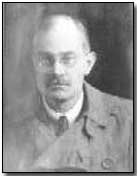Feature Articles - The Repression of War Experience by W. H. Rivers

Fitness for Military Service
Before I conclude a few words must be said about an aspect of my subject to which I have not so far referred. When treating officers or men suffering from war neurosis we have not only to think of the restoration of the patient to health; we have also to consider the question of fitness for military service. It is necessary to consider briefly the relation of the prescription of repression to this aspect of military medical practice.
When I find that a soldier is definitely practising repression I am accustomed to ask him what he thinks is likely to happen if one who had sedulously kept his mind from all thoughts of war, or from special memories of warfare, should be confronted with the reality, or even with such continual reminders of its existence as must inevitably accompany any form of military service at home.
If, as often happens in the case of officers, the patient is keenly anxious to remain in the Army, the question at once brings home to him the futility of the course of action he has been pursuing. The deliberate and systematic repression of all thoughts and memories of war by a soldier can have but one result when he is again faced by the realities of warfare.
Several of the officers I have described or mentioned in this paper were able to return to some form of military duty, with a degree of success very unlikely if they had persisted in the process of repression.
In other cases, either because the repression had been so long continued or for other reason, return to military duty was deemed inexpedient. Except in one of these cases no other result could have been expected with any form of treatment.
The exception to which I refer is that of the patient who had the sudden attacks of reasonless depression. This officer had a healthy appearance and would have made light of his disabilities at a medical board. He would certainly have been returned to duty and sent to France.
The result of my line of treatment was to produce a state of anxiety which led to his leaving the Army. This result, regrettable though it be, is far better than that which would have followed his return to active service, for he would inevitably have broken down under the first stress of warfare, and might have produced some disaster by failure in a critical situation or lowered the morale of his unit by committing suicide.
Next - Necessity of Adopting a Middle Course
Observation balloons were referred to as 'sausages'.
- Did you know?
